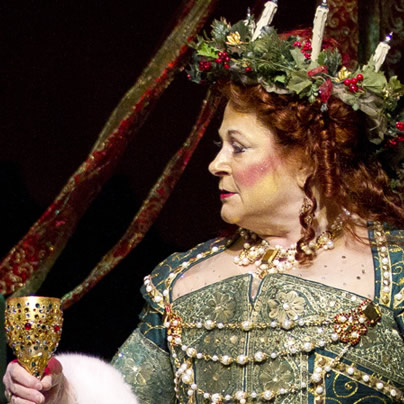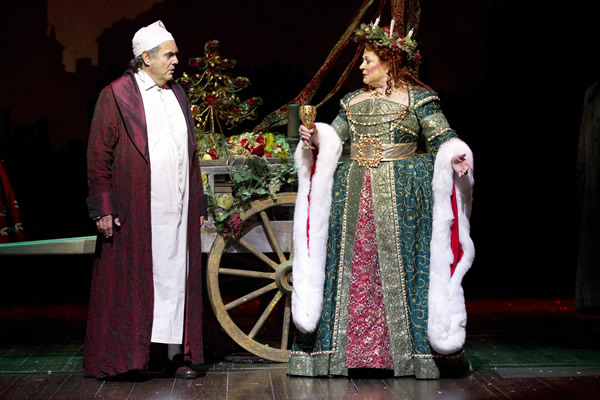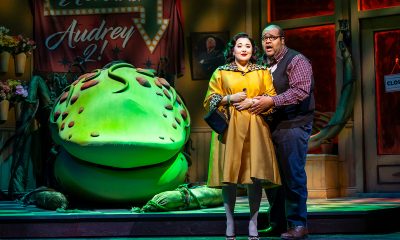Arts & Entertainment
Ford’s tradition revisited
More ghost-oriented version of Dickens classic revived with aplomb

‘A Christmas Carol: A Ghost Story of Christmas’
Through Dec. 30
Ford’s Theatre
511 10th Street, NW
$22-$89
800-982-2787
fords.org

Edward Gero as Scrooge and Anne Stone as the Ghost of Christmas Present in the Ford Theatre production of ‘A Christmas Carol.’ (Photo by Scott Suchman; courtesy of Ford’s Theatre)
Not yet in the holiday spirit? Then make a beeline to Ford’s Theatre for a jolt of yuletide cheer.
Ford’s has been presenting Charles Dickens’ Christmas classic since 1979, but for the last several years it’s been retelling the Scrooge story with an especially entertaining and timely adaptation by Michael Wilson titled “A Christmas Carol: A Ghost Story of Christmas.”
Adeptly staged by gay director Michael Baron, this version is spookier than previous productions with its haunted house effects (spinning bed, talking portrait, booming thunderclaps and flashes of lighting); but it’s also merrier. The show begins with happy 19th century Londoners ambling through the historic theater, welcoming audience members. Baron has also added song and dance including familiar carols like “God Rest Ye Merry Gentlemen,” “O Christmas Tree” and “O Come, All Ye Faithful.” And the holiday bash at the Fezziwigs’ (a pleasant memory from Scrooge’s youth) is a lively dance number led by a terrific Rick Hammerly as the jolly host.
But the heart of this “A Christmas Carol” is Edward Gero’s marvelous portrayal of that formidable miser whose icy heart is melted after nocturnal visitors open his eyes to the joys of the season. His Scrooge’s gradual transformation from miserable misanthrope to generous, joyous uncle, feels wholly believable.
As the kindly and elegant Ghost of Christmas Past, Felcia Curry floats above the stage, the dazzling incarnation of a sparkly little marionette seen earlier in the London marketplace. Other ghosts include James Konicek as Scrooge’s long dead friend and business partner Jacob Marley, Jane Stone as the saucy and straight shooting Ghost of Christmas Present and a floating silent specter (Curry again) as the terrifying Ghost of Christmas future.
Set designer Lee Savage supplies a soaring Victorian iron structure inspired by London’s Convent Garden marketplace and dominated by an imposing clock that portentously marks the comings and goings of Scrooge’s ghostly visitors. Alejo Vietti expertly costumes the cast in period top hats, bonnets, hoop skirts and night shirts — all that we’ve come to associate with strolling carolers and late night Christmas tales.
Wilson’s script is relevantly witty, sometimes a little darkly so: When raising a glass, old Scrooge makes a toast to “a quick foreclosure.” Ouch. Wilson also includes some nice glimpses into the modest life of Scrooge’s clerk, Bob Cratchit, and his wife nicely played by John Lescault and Amy McWilliams respectively.
Other standouts in a fine cast comprised of many local actors include the fetching Helen Hedman who plays both gracious Mrs. Fezziwig and Scrooge’s wily housekeeper Mrs. Dilber; Tom Story as Scrooge’s good-humored nephew; and Gregory Maheu as the eager but slightly awkward young bachelor Topper. The cast’s children sing sweetly and give very natural performances. Holden Browne and Sam Ellis rotate the role of Tiny Tim.
Though Dickens’ Christmas story is old, its message and Ford’s production feel anything but.

Team DC, the umbrella organization for LGBTQ-friendly sports teams and leagues in the D.C. area, held its annual Night of Champions Awards Gala on Saturday, April 20 at the Hilton National Mall. The organization gave out scholarships to area LGBTQ student athletes as well as awards to the Different Drummers, Kelly Laczko of Duplex Diner, Stacy Smith of the Edmund Burke School, Bryan Frank of Triout, JC Adams of DCG Basketball and the DC Gay Flag Football League.
(Washington Blade photos by Michael Key)




















The 2024 National Cannabis Festival was held at the Fields at RFK Stadium on April 19-20.
(Washington Blade photos by Michael Key)
















Covering the @NatlCannaFest at RFK Stadium for @WashBlade . Stop by the LGBTQ+ booth and pick up a paper if you are here. pic.twitter.com/is7hnsaPns
— Michael Patrick Key (@MichaelKeyWB) April 20, 2024
Theater
‘Amm(i)gone’ explores family, queerness, and faith
A ‘fully autobiographical’ work from out artist Adil Mansoor

‘Amm(i)gone’
Thorough May 12
Woolly Mammoth Theatre
641 D St., N.W.
$60-$70
Woollymammoth.net
“Fully and utterly autobiographical.” That’s how Adil Mansoor describes “Amm(i)gone,” his one-man work currently playing at Woolly Mammoth Theatre.
Both created and performed by out artist Mansoor, it’s his story about inviting his Pakistani mother to translate Sophocles’s Greek tragedy “Antigone” into Urdu. Throughout the journey, there’s an exploration of family, queerness, and faith,as well as references to teachings from the Quran, and audio conversations with his Muslim mother.
Mansoor, 38, grew up in the suburbs of Chicago and is now based in Pittsburgh where he’s a busy theater maker. He’s also the founding member of Pittsburgh’s Hatch Arts Collective and the former artistic director of Dreams of Hope, an LGBTQ youth arts organization.
WASHINGTON BLADE: What spurred you to create “Amm(i)gone”?
ADIL MANSOOR: I was reading a translation of “Antigone” a few years back and found myself emotionally overwhelmed. A Theban princess buries her brother knowing it will cost her, her own life. It’s about a person for whom all aspirations are in the afterlife. And what does that do to the living when all of your hopes and dreams have to be reserved for the afterlife?
I found grant funding to pay my mom to do the translation. I wanted to engage in learning. I wanted to share theater but especially this ancient tragedy. My mother appreciated the characters were struggling between loving one another and their beliefs.
BLADE: Are you more director than actor?
MANSOOR: I’m primarily a director with an MFA in directing from Carnegie Mellon. I wrote, directed, and performed in this show, and had been working on it for four years. I’ve done different versions including Zoom. Woolly’s is a new production with the same team who’ve been involved since the beginning.
I love solo performance. I’ve produced and now teach solo performance and believe in its power. And I definitely lean toward “performance” and I haven’t “acted” since I was in college. I feel good on stage. I was a tour guide and do a lot of public speaking. I enjoy the attention.
BLADE: Describe your mom.
MANSOOR: My mom is a wonderfully devout Muslim, single mother, social worker who discovered my queerness on Google. And she prays for me.
She and I are similar, the way we look at things, the way we laugh. But different too. And those are among the questions I ask in this show. Our relationship is both beautiful and complicated.
BLADE: So, you weren’t exactly hiding your sexuality?
MANSOOR: In my mid-20s, I took time to talk with friends about our being queer with relation to our careers. My sexuality is essential to the work. As the artistic director at Dreams of Hope, part of the work was to model what it means to be public. If I’m in a room with queer and trans teenagers, part of what I’m doing is modeling queer adulthood. The way they see me in the world is part of what I’m putting out there. And I want that to be expansive and full.
So much of my work involves fundraising and being a face in schools. Being out is about making safe space for queer young folks.
BLADE: Have you encountered much Islamophobia?
MANSOOR: When 9/11 happened, I was a sophomore in high school, so yes. I faced a lot then and now. I’ve been egged on the street in the last four months. I see it in the classroom. It shows up in all sorts of ways.
BLADE: What prompted you to lead your creative life in Pittsburgh?
MANSOOR: I’ve been here for 14 years. I breathe with ease in Pittsburgh. The hills and the valleys and the rust of the city do something to me. It’s beautiful, it’ affordable, and there is support for local artists. There’s a lot of opportunity.
Still, the plan was to move to New York in September of 2020 but that was cancelled. Then the pandemic showed me that I could live in Pittsburgh and still have a nationally viable career.
BLADE: What are you trying to achieve with “Amm(i)gone”?
MANSOOR: What I’m sharing in the show is so very specific but I hear people from other backgrounds say I totally see my mom in that. My partner is Catholic and we share so much in relation to this.
I hope the work is embracing the fullness of queerness and how means so many things. And I hope the show makes audiences want to call their parents or squeeze their partners.




















